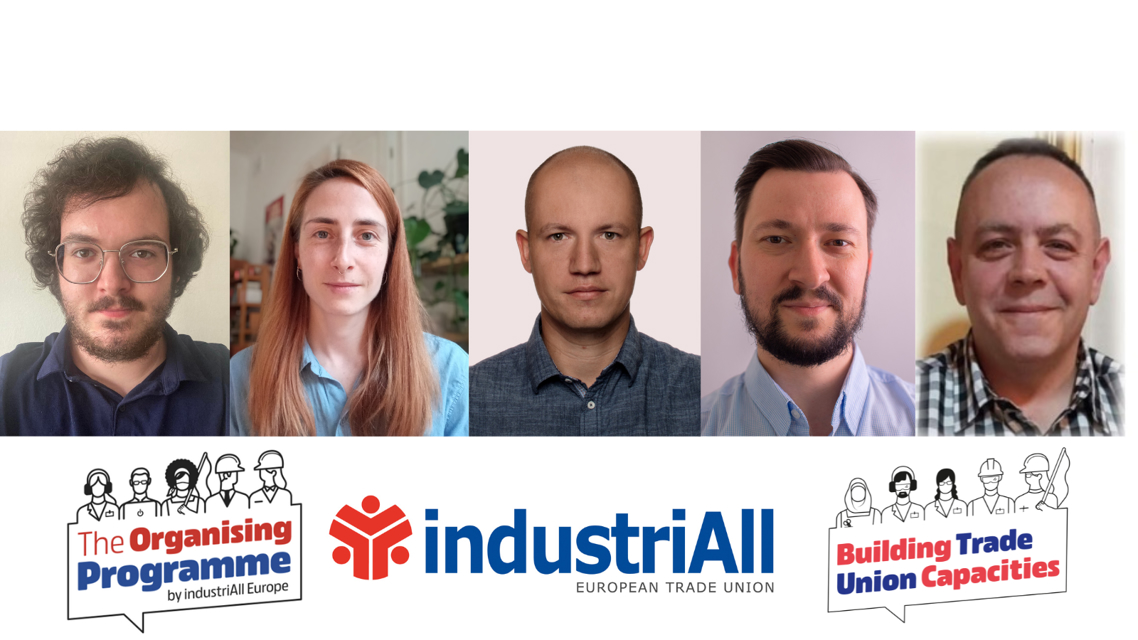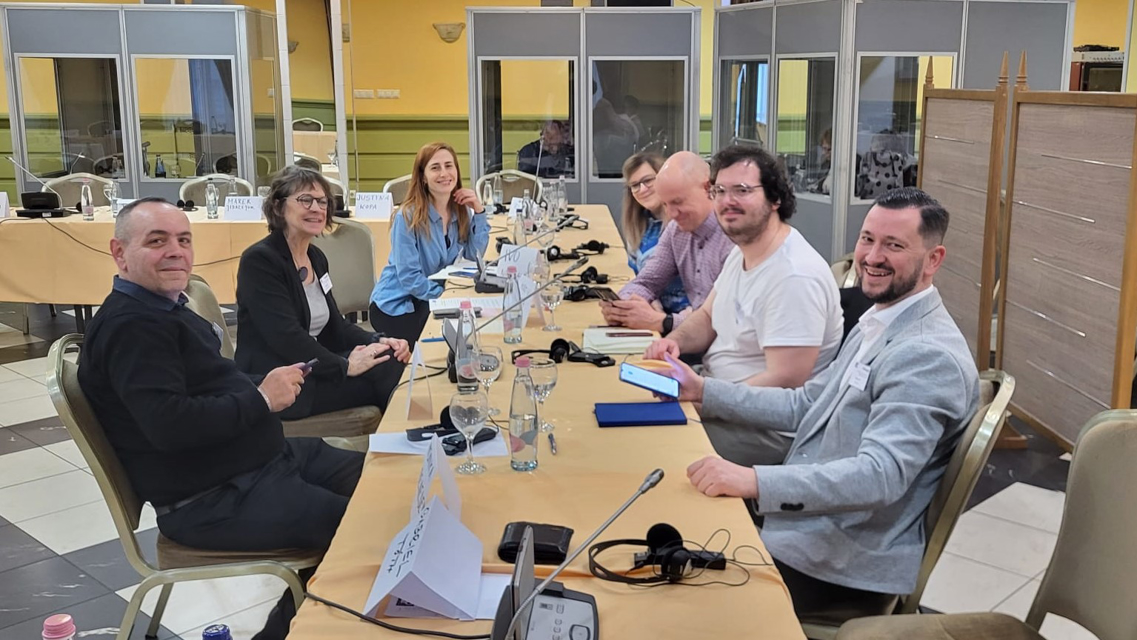Together we will build a strong network and a strong trade union movement fit for the future.
The initiative is part of the newly launched 'Building Trade Union Capacity For Recovery' project, which will support affiliates in Central and Eastern Europe to build their capacity to strengthen and retain members in times of profound industrial change. We have selected five countries to pilot the project, which are part of international supply chains in key industries and are facing major changes accelerated by the pandemic: Poland, the Czech Republic, Slovakia, Hungary, and Serbia.
The aim of this EU-funded project is to initiate concrete organising projects for trade unions to develop their own ways of recruiting more members and building trade union power in strategically important sectors. This will increase trade union organising capacity and lay the foundations for stronger collective bargaining. The new BTUP team will be at the side of our organisations as they invest in building union power in this way.
With this project, we are laying the foundations for a network of organisers and trade unions who will actively pursue organising projects in Central and Eastern Europe.
Our organisers will work with GS Metalica, GS PPI and GS RIE, SSMS, ISS in Serbia, BDSZ in Hungary, OZ KOVO in Slovakia, OS KOVO in the Czech Republic and FZZMiH in Poland on concrete targets and objectives. The organisers will not be isolated: they will exchange ideas, learn from each other across borders and develop organising strategies and practical work plans.
IndustriAll Europe General Secretary Luc Triangle said:
“We are delighted to welcome our new team members. They bring a new dimension to industriAll Europe’s work and are our boots on the ground.Trade unionism starts in the workplace. We invite all affiliates to nominate their own organisers and develop their own organising projects. Together we will build a strong network and a strong trade union movement fit for the future. IndustriAll Europe supports you!”
Marek Jędrzejuk,
Why am I an organiser?
I became an organiser because I believe that only by being active can we improve the working conditions of many people.
What does "strong union" mean to me?
A strong union is one that brings together conscious people working together for a just cause. The challenge nowadays is motivating employees to present their opinion in solidarity and to show dissatisfaction with the current situation in companies.
What do I see as the biggest challenge/threat for organising?
The challenge nowadays is motivating employees to present their opinion in solidarity and to show dissatisfaction with the current situation within companies. By disseminating the current activities and successes of trade union organizations, as organizers, we are able to influence people's thinking about the need to join trade unions.
How can my work contribute to building trade union power?
I see the possibility of mutual benefits for the employer and employees from the existence of trade unions. I want to make the employer openly present his problems and be able to solve them in consultation with trade unions and vice versa.
What do I desire for industrial workers in the future?
I hope that with the job we are doing as trade union organizers, in the future, industrial workers will understand the importance of joining a trade union, and feel confident enough to share their dissatisfactions and make a change.
Where do I see unions/my union in five years from now?
I see my union, and other unions increasing their memberships, and working together to bridge the gap between employers and employees in order to create a more beneficial working environment for both.
Jaromir Vales
Why am I an organiser?
I became a union organiser because I find it important to improve working conditions. I was raised by a single mother in a small town, so I know first hand how precarious work looks like and I want to be a part of the force that tackles it.
What does "strong union" mean to me?
Strong unions not only have many members, they must also be ready to take brave actions. In Czechia, unions are sometimes seen as an obsolete institution for older workers, mostly men working in the industry. We need to make unions attractive and meaningful for everyone - for employees of all generations, genders and sectors.
What do I see as the biggest challenge/threat for organising?
I see the biggest threat for organizing in employees’ fear, but it is organizing that can overcome this fear and build solidarity.
How can my work contribute to building trade union power?
I can contribute to building trade union power by showing more people in Czechia that union organizing makes sense and supports change. I want them to see that activization and mobilization is the way forward for the 21st century trade union movement.
What do I desire for industrial workers in the future?
I wish for industrial workers to be respected and granted dignified conditions in the transforming world, mainly with an emphasis on just transition. I don’t want them to be worried about their livelihood - on the contrary, I want them to thrive and have all their needs fulfilled.
Where do I see unions/my union in five years from now?
I believe my union, OS KOVO, will be a confident organization whose members can be proud to be a part of it. I believe it can show direction and share best practices in union organizing and union work in general.
Dalibor Antanasijevic
Why am I an organiser?
I became a union organiser because I love and enjoy the job. I can help my colleagues make unions stronger by using the tools at our disposal and teaching unionists.
What does "strong union" mean to me?
For me the words "strong union" mean that there is a majority of union members in a company, that workers are united and ready to act if necessary. A strong union has strong collective agreements.
What do I see as the biggest challenge/threat for organising?
The biggest challenges in my opinion are how to unionize companies that are still opposed to unions? How do we strengthen already existing unions in companies? How do we promote social dialogue and encourage the signing of a collective agreement?
How can my work contribute to building trade union power?
By working together with the member unions of IndustriALL Europe in Serbia, by my efforts in the sense of training union trustees in charge organizing in their unions, by recognizing colleagues who are ready and have a capacity, will and desire to contribute to the strengthening of union structures, both in their unions and the trade unions organizations throughout Serbia.
What do I desire for industrial workers in the future?
My wish for industrial workers in the future is that they will all be unionized, that they will be united and decisive in their actions, that they will not be afraid of their employers and that they will have decent wages and a safe and healthy working environment.
Where do I see unions/my union in five years from now?
If we make an effort to work hard in the next five years, I see the vast majority of my country as a becoming a unionized country where workers are protected, satisfied, and therefore productive in their jobs.
Eszter Turai
Why am I an organiser?
I became a union organiser because I believe that workers need to be organised to be able to protect themselves against the profit-motive of the company, that would otherwise overpower them. As an organiser I can work for building communities and solidarity between people, which can be a base for further social change.
What does "strong union" mean to me?
A strong union means a union with an active membership that stands up for better conditions in and outside of the workplace.
A strong union recognises that employers and workers have conflicting interests, therefore “if you want peace, prepare for war”.
What do I see as the biggest challenge/threat for organising?
In my opinion, Hungarian workers, especially female workers, have very low expectations regarding working conditions, wages and treatment from their employer. They are often used to exploitative practices. It is hard to raise hopes and make them believe that should have better working conditions.
Another big obstacle to tackle is that workplace communities are highly divided and workers tend to turn against each other, rather than the leadership.
How can my work contribute to building trade union power?
I’m working on getting in and establishing a union branch at workplaces without any existing union activity or members/contacts. My task is to facilitate worker-led campaigns to improve working conditions at the company. This work contributes not only to stronger worker communities and increased membership-focus of my union, but also to our experience on greenfield organising methods.
What do I desire for industrial workers in the future?
Strength and unity to protect workers’ interests in all parts of the world. Networks of workers who support each other inside and outside of the workplace in crises and changes that we face.
Where do I see unions/my union in five years from now?
Working together to increase the involvement of workers. I hope that European industrial unions will find creative and brave responses to the changes in the economic structure and the climate crisis without losing sight of workers’ interests.
Gabriel Tóth
Why am I an organiser?
I intrinsically believe that empowering the workers is the only way to counterbalance the power of the corporations and firms. A united voice is a power for better conditions for everybody, better communication and dignity in the workplace.
What does "strong union" mean to me?
A strong union for me is an active union, that is true to its values, that tries to resolve meaningful problems in a no-nonsense manner. If the unions show the values to its members, through gaining trust from them it will become stronger.
What do I see as the biggest challenge/threat for organising?
The biggest threat is that for the workers the unions will become a “banality”, and so they will lose power and a possibility for better work conditions.
How can my work contribute to building trade union power?
Through implementing and lecturing about the organizing tools, principles and values, I hope for activisation of the intended union base organisations and members in Slovakia.
What do I desire for industrial workers in the future?
I desire that they will trust in themselves, in the power of their unified voice. In an uncertain world full of unfairness, the workers need to concentrate their power.
Where do I see unions/my union in five years from now?
I think through the BTUC4R project and the dedication of me and my colleagues, OZ KOVO will have in five years a strong understanding of organizing, with a fully developed net of lecturers, lectures, consultations, that will raise the number of OZ KOVO members. It will start a longer process by showing professionality, hope and strength in the wider Slovak society. Through better communications we raise awareness, through better tools and organizing we build stronger worker communities, that will show strength, results and solidarity.

